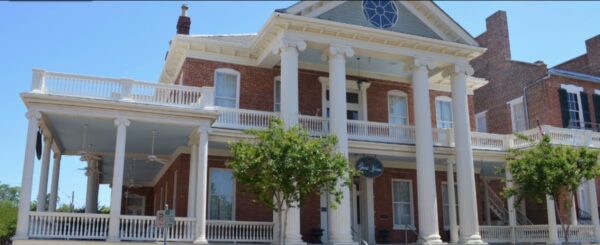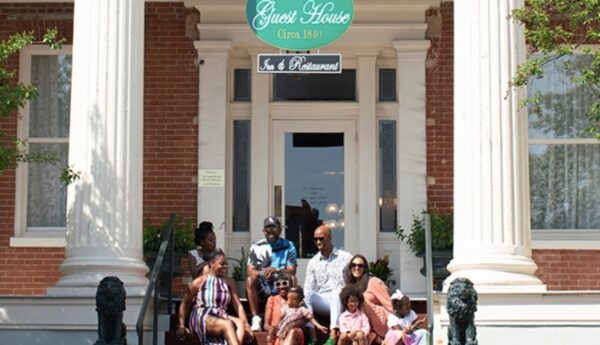Plantation homes are not often considered business opportunities for many Black Americans who view these structures as reminders of the horrors of enslavement. However, three Black entrepreneurs are looking to shift the narrative of a famed bed and breakfast in Natchez, Mississippi.

In March, Natchez native Joseph C. Smith, as well as Michael and Tiffany Clinton of Los Angeles, purchased The Guest House, an expansive bed-and-breakfast that was once a plantation home.
“I remember riding past here as a kid and imagining what life was like for those who had lived here,” Smith told The Natchez Democrat. “I don’t know anyone who didn’t at least drive by here and be mesmerized by The Guest House. This is like a full-circle moment, being able to arrive at a place where we could acquire the mansion and be able to interpret the history of the mansion in a unique way because I don’t think there has been an antebellum mansion of this size that has been owned by African-Americans.”

Natchez was once the capital of the cotton trade and its proximity to other Southern ports made it essential to the slave trade. When The Guest House was built in the 1840s it was the home of local businessman, John Newman. The home changed ownership many times before its conversion to a bed-and-breakfast in the 1980s.
Located in Natchez’s historic downtown district, it was once named one of the most romantic inns in the South. The bed and breakfast features 16 guest rooms each with a private bathroom. For many tourists, The Guest House offers the opportunity to relax in the parlor or the French Quarter-style courtyard, while others enjoy discovering Natchez and its history. For the partners, owning The Guest House provides the agency to share an enhanced narrative of Southern history and culture through the lens of not only antebellum owners but also Black Americans.
“Natchez is more important to Black people than we realize,” co-owner Michael Clinton told Finurah. “It was at one point the capital of the cotton trade and that makes it kind of the intersection of all that was wrong in America and all that could be right in America.”
When the Clintons and Smith purchased The Guest House, they saw owning the property as a chance to continue building generational wealth while also contributing to Natchez’s history and culture.
“If we start to reclaim assets like this and figure out how to make them transformative and then catapult us to overcoming everything that systemic racism has done to us historically,” Clinton said. “We’re doing it for the culture, and we can’t fail.”
This is not the partners’ first foray into entrepreneurship.
Smith heads Joseph A.C. Smith Ministries and Black Natchez.org. He plays an integral role in community engagement and business development within Natchez. Michael Clinton is a venture capitalist and real estate investor who owns several hundred properties throughout the United States. His wife, Tiffany, is an attorney specializing in corporate transactional law.
The partners first met 11 years ago when Smith officiated the Clintons’ wedding and became friends. Fast forward to 2019, Smith saw an online posting for a bed-and-breakfast in Natchez. They responded to the listing, only to not hear back for several months. When Smith realized that it was The Guest House, they jumped at the opportunity.
“That was kind of our first foray into hospitality. Our experience with that made it an easy transition into something like this, not that we would have done this without Joseph,” Clinton told the Natchez Democrat. “You really need a local connection to make this work.”
While Smith is often in Natchez, he is able to handle much of the operations of the bed-and-breakfast, which also includes a restaurant. Clinton, who often works remotely, is dedicated to making strategic decisions for the property.
For the partners, The Guest House is a unique opportunity to blend tourism, acquiring historical assets with economic development. Currently, the Clintons also manage another B&B property along the Mississippi River and are looking to purchase other plantation properties in the future.
“We definitely want to acquire another plantation that has all of the acreage that you would assume a normal plantation would have and ideally use it for hospitality,” Clinton said. “But I think we want to have more impact locally and expand our footprint.”




